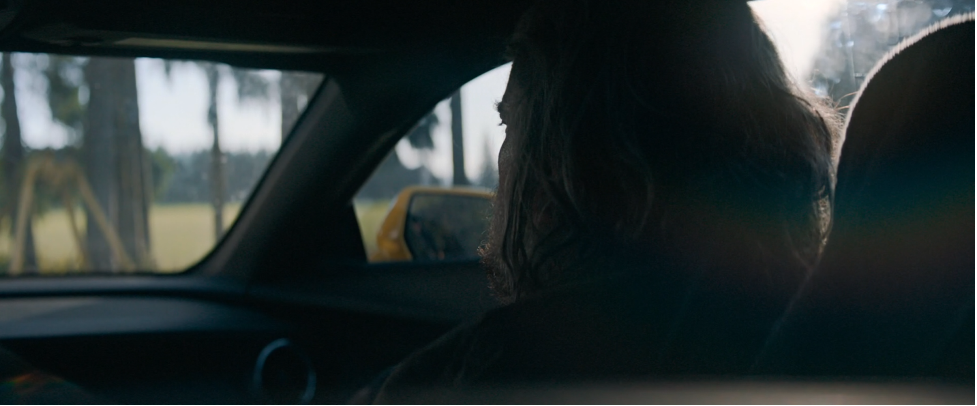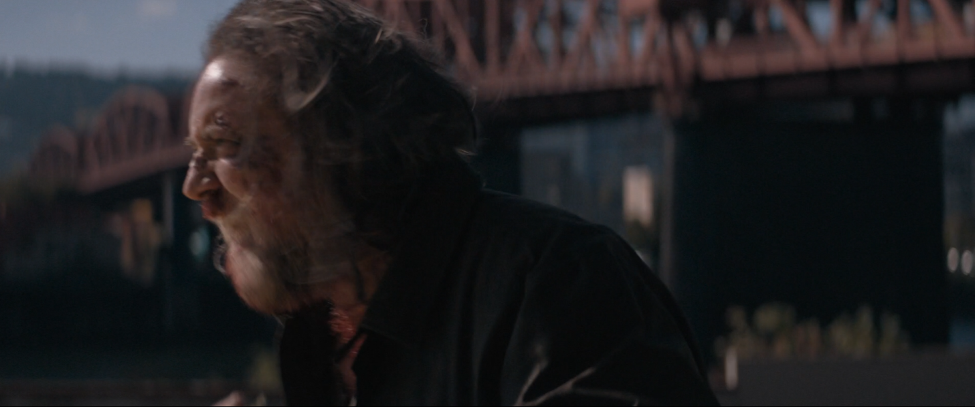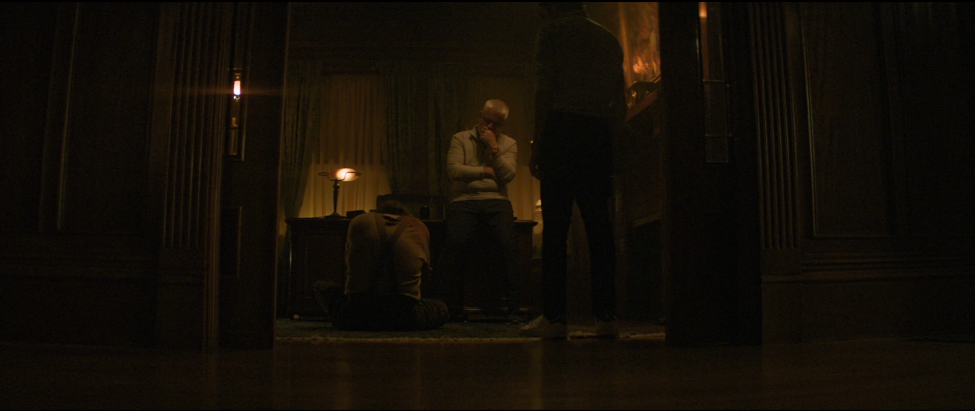Get in the Cage
1
"Brandy was her name."1 The pig's, that is. The one that acted across from Nicolas Cage in Michael Sarnoski's directorial debut Pig. The titular sow. She was untrained, and so when they needed her to look lovingly at Cage, they'd hold carrot behind his head. "She was, like many of us, payment oriented."2 In her short time on screen, Brandy's nameless character is motivated by a bite of each truffle she finds, offered by Cage's Robin Feld to impel her to continue.
Cage famously squandered $150 million at the height of his opulence, wasting the earnings from his early action films and forcing him to return to the well, establishing him as an actor willing to take on nearly any action role, provided it pays enough (J. D. Connor's essay in this cluster discusses Cage's spending habits in greater depth). And yet Cage is also driven by an auteur impulse to make movies for artistic reasons, films such as Leaving Las Vegas, Red Rock West, Raising Arizona, and Adaptation. (His salary for National Treasure was nearly five times the budget for Leaving Las Vegas). In Pig, Feld is an avatar for auteur-Cage, having abandoned his hyper-successful career as a chef to move to the Oregon woods in a failed attempt to escape capitalism.
For Sarnoski, Feld's retreat to the forest represents a "more traditional, bucolic way of life."3 When Amir — Feld's truffle buyer, played by Alex Wolff — arrives, no money changes hands, though shortly after we see Feld storing groceries Amir brought him, emphasizing that though Feld may spurn the appearance of exchange, the process is still there. Auteur-Cage may not prioritize money, but he still gets paid. Soon Feld and Amir are on their way to a truffle trading outpost, where hunters drop off their finds. Mac, the woman who runs the place, tells Amir, "I don't like buyers coming out to the site," calling attention to the rural woods as a space for those who wish to exist outside exchange — though it is only through buyers that the outpost survives.
As Feld tells Mac that he used the now-stolen pig to hunt for truffles, his body shakes with nervous energy, revealing both his anxiety from once again being around others and also foreshadowing a violent release that never arrives. The way Cage plays Feld in this moment suggests the quiet understated performance Cage has delivered so far is building up to a classic Cage meltdown, as though Feld's realization that he has been unable to escape exchange will drive him to vengeance against those who destroyed his reverie. Auteur-Cage's pretensions are stymied, and the expectation is that action-Cage will emerge as a result. After the pignapping, Feld receives offers of money or a replacement pig, which he refuses. This was an animal with whom he shared his bed, his plate, his life. To Feld, no amount can replicate how his porcine friend curled up next to him when they slept. She was also exceptionally good at her job. In the brief time we see her searching, she and Feld find two truffles. One he uses for their meal. The other he sells to Amir, the first to suggest buying a new pig. Feld blanches. "Another pig couldn't do what she did." Cage is shot from behind, obscuring whatever emotion is on his face, while is voice cracks with a mixture of sadness and anger. Again, he is on the brink of a breakdown.

After Feld finds out it was Amir's father Darius who kidnapped his pig, he demands to know Darius's address. This is the closest the film comes to a Cage meltdown. Cage kicks Amir's Camaro while grunting rhythmically. He bellows a classic Cage scream, his face contorting as he slams his hands on the car. Amir acquiesces, only for Darius to also offer an exchange: first $15,000 to walk away, then $20,000, then jokingly $20 million, and finally saying that he will have $25,000 delivered to Feld's campground by the next day. Feld leaves dejected. It is only then that Feld admits to Amir that he "doesn't need [his] pig to find truffles" because the trees tell him where to look. Amir asks, "so why the fuck did we do all this?" The answer is simple. "I love her." The pig, we learn, is a substitute for his dead wife.

2
After learning that his pig was taken to Portland, Feld pressures Amir to drive him there. A few people who remember Feld as a superstar chef are still around. One of these is Edgar, played by Darius Peirce, a shadowy figure who hosts illegal fights for the city's kitchen staff. He is Feld's first stop. Feld brings him food and asks about his pig, only for Edgar to respond, "I remember a time when your name meant something to people, Robin. But now, you have no value. You don't even exist anymore," handing back the food. Shortly after, Amir and Feld make their way down to the abandoned hotel lobby where Edgar holds his fights. Feld walks to the board and writes his name in bold letters. The bidding starts. Once Feld takes his licks, Edgar gives him a piece of paper with a name, allowing Feld to continue his quest. His own name is now worth something, he once again exists.
Coming a third of the way into the movie, Edgar's fight scene is revelatory. This is when the film announces that this is not another John Wick. Despite the trailer's lack of violence and yelling, it still suggested an absurdist take on the Keanu Reeve franchise, one set in hipster Portland instead of a New York populated by rockabilly models. It did so through the sort of quick cuts associated with action movies and a voice-over by Cage where it sounds like he is about to explode. Combined with his reputation, these techniques allowed audiences to imagine they were seeing what was not actually there — the trailer for an action film. And the cinematic language early in the film, particularly just before the hog is kidnapped, extends this idea. In a scene that would not be out of place in Wick or the Taken franchise, we are treated to loving shots of Feld telling his oinking pig, anxious about noises outside, that "it's just cayotes. Stand back girl." They settle into the bed, and the screen goes black for five full seconds, before cutting to car headlights driving through the forest, which marks the beginning of the chaos. Feld, awoken by the oinking pig, goes to comfort her and tell her it is still just cayotes, when he hears a twig snap outside. Before he can react, the door is kicked in, knocking him to the ground. He tries to stand up and attack the intruders with a knife, only to get hit across the head with a frying pan. The audience hears the kidnappers freaking out. "Oh my god. Oh Oh. Go go go go." Feld tries to crawl while the pig's screams continue, but the head injuries are too much, and he passes out.
There is no bloody revenge; Cage wallows in sad desperation. In the underground fight scene, the audience expects Cage to reveal himself as a hero, beating up all comers and intimidating Edgar into giving him information about where his pig is. But all we get are the sickening thuds of a man being hit while he's down. And when he goes to ask Edgar for the pig, he does not yell or rend his garments or gnash his teeth, but slowly and quietly stumbles over to the table and asks with a voice barely above a whisper. Cage's performance refuses to give what we expect, refuses to assimilate to his oeuvre. And yet like Feld putting his name on the board, Cage has put his name on the movie, put it into the filmography, into a relationship with everything else he has made. As a Nicolas Cage film, it carries with it the burdens of his filmic choices. Cage indulges in comparisons with his previous work, dialectically subverting them through his performance, revealing a resistance that simple denial would be unable to achieve. He uses his reputation, the trailer, and his performance in the first half of the film to lull audiences into believing this is another Cage action film, only to refuse this in the second half of the film.
If the fight scene is when the film reveals that it is as much about Cage and his history as about a pig, his showdown with Darius clinches it. Feld faces down the antagonist, who is also another version of Cage. Adam Arkin — the actor who plays Darius — speaks in the pitch and cadence of a classic Cage hero, growling threats. He says, "I hide what I am well." The line could apply to Cage's performance here, hiding the overblown monster in an understated performance. And yet it also could not, for along with the action Cage there has always been the auteur Cage. At first, the scene seems to admit this difference. We watch Cage-as-Feld staring at his other identity, wondering what it will take to escape, or whether no matter how much he fights, he will always be chained to his meme.

Darius kicks Feld out of his house. Action-Cage wins. But Feld, auteur-Cage, cannot admit defeat. He decides to cook the meal Darius and his now-comatose wife once shared at Feld's restaurant, hoping the memory will soften Darius. He uses his craft (cooking for the character, acting for the star) to reveal that Cage is not a duality but a dialectic, with each half containing the opposite within it. Feld, Amir, and Darius sit down to eat, but after a couple bites and a sip of the wine (the same as what they drank that last happy night), Darius begins to tear up and flees to his office. Feld follows, and the scene becomes a synecdoche for the movie, which in turn is an allegory for Cage's career. Seeing Robin has followed him, Darius explodes. "GET OUT! GET OUT! GET OUT!" Robin responds by emphasizing his craft. "I remember every meal I've ever cooked." With this, Darius breaks down weeping and admits the pig is dead. Feld collapses, also crying. Sarnoski cuts between close-ups of the two and Amir — a surrogate for the viewer, originally caught between the two Cages and unsure where his loyalty lies, but now realizing that the two are one and the same — with Arkin (playing action-Cage) taking on the subtlety of auteur-Cage with his soft weeping, while auteur-Cage indulges in the other's over-acting through his collapse to the ground. But even here, there is not a full synthesis. Sarnoski pulls back to a wide shot, showing the two still separate, before the scene cuts to black. Darius and Feld are left as two halves which do not add up to a whole. Like them, auteur and action Cage can never be reconciled; Hollywood's division of labor is too entrenched. Only with the end of capitalism could Nicolas Cage be made whole.
Miles Taylor (@MTisempty) is a PhD student in Film and Media at the University of California, Berkeley. His research interests include the Frankfurt School, capitalism's secular crisis, narratology, and post-1970 American film and literature. He has previously written for No Cinema! and In Bed with Maradona.
References
- Nicolas Cage, "Nicolas Cage on the Magic of Working with Animals," interview by Gabriella Paeiella, GQ, July 14, 2021.[⤒]
- Ibid.[⤒]
- Victoria Petersen, "In Nicolas Cage's 'Pig,' How Mush Is the Truffle Hog Worth Anyway?" The New York Times, July 16, 2021.[⤒]
